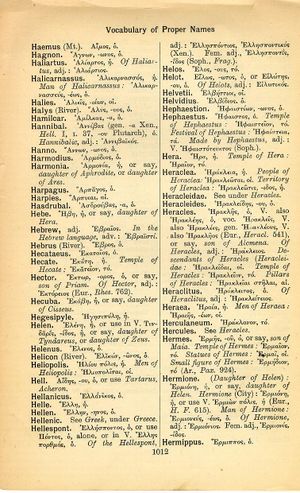Hecuba: Difference between revisions
From LSJ
Οὕτως γὰρ ἠγάπησεν ὁ Θεὸς τὸν κόσμον, ὥστε τὸν Υἱὸν τὸν μονογενῆ ἔδωκεν, ἵνα πᾶς ὁ πιστεύων εἰς Αὐτὸν μὴ ἀπόληται ἀλλ᾽ ἔχῃ ζωὴν αἰώνιον → For God so loved the world that he gave his only begotten Son that whosoever believeth in him should not perish but have everlasting life (John 3:16)
(Names) |
(6_7) |
||
| Line 1: | Line 1: | ||
{{WoodhouseENELnames | {{WoodhouseENELnames | ||
|Text=[[File:woodhouse_1012.jpg|thumb|link={{filepath:woodhouse_1012.jpg}}]]Ἑκάβη, ἡ, or say, <b class="b2">daughter of Cisseus.</b> | |Text=[[File:woodhouse_1012.jpg|thumb|link={{filepath:woodhouse_1012.jpg}}]]Ἑκάβη, ἡ, or say, <b class="b2">daughter of Cisseus.</b> | ||
}} | |||
{{Lewis | |||
|lshtext=<b>Hĕcŭba</b>: ae, and Hĕcŭbē, ēs, f., = Ἑκάβη,<br /><b>I</b> the [[daughter]] of [[Dymas]], [[wife]] of [[Priam]]; [[after]] the [[destruction]] of [[Troy]] the [[slave]] of [[Penelope]], changed [[through]] [[rage]] [[into]] a [[dog]], Verg. A. 2, 501; 515; Ov. M. 13, 423; 549 sq.; 577; Cic. Tusc. 3, 26, 63; id. Fat. 15, 34.—Transf., an [[ugly]] old [[woman]] (opp. to [[Andromache]]), Mart. 3, 76, 4. | |||
}} | }} | ||
Revision as of 08:03, 13 August 2017
English > Greek (Woodhouse)
Ἑκάβη, ἡ, or say, daughter of Cisseus.
Latin > English (Lewis & Short)
Hĕcŭba: ae, and Hĕcŭbē, ēs, f., = Ἑκάβη,
I the daughter of Dymas, wife of Priam; after the destruction of Troy the slave of Penelope, changed through rage into a dog, Verg. A. 2, 501; 515; Ov. M. 13, 423; 549 sq.; 577; Cic. Tusc. 3, 26, 63; id. Fat. 15, 34.—Transf., an ugly old woman (opp. to Andromache), Mart. 3, 76, 4.

